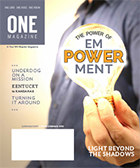
June-July 2017
The Power of
Empowerment
------------------
|






The Power of Empowerment
By Don Matchett
Sheila Valdés is not a household name among Free Will Baptists in the U.S., but for the last few years she has been invaluable to Free Will Baptists in Panama. Anyone who has attended a youth event in that country knows she is no amateur. She certainly doesn’t do it alone, but every event is challenging, inspiring, educational, well organized, and non-stop. One minute you are out of breath, the next you laugh yourself to tears, and the next you are overcome by the Word of God.
I’m sure it hasn’t always been perfect, but watching Miss Valdés organize and execute a camp now is like watching a conductor lead a finely tuned orchestra. And her journey as the national youth director started with empowerment.
Empowerment, in most cases, sits on the shelf of forgotten capital, like a valuable stock waiting to be remembered and cashed in. The good news is empowerment costs nothing but time, training, communication, and courage. In contrast, the lack of empowerment creates a vacuum that sucks away creativity, wisdom, and fellowship, as well as spiritual and numerical growth.
This vacuum is propelled by the idea that the church should be run only by trained professionals. This is not to say we shouldn’t expect professionalism. Everything should be done with excellence, but even professionals do not start as professionals. And being a “professional” is no guarantee of professionalism, either.
Yet, a professionally-led church leaves the rest of the church to operate as consumers—only taking and not giving any service in return. And consumers are extremely fickle. “If I don’t like the show, I can and will change the channel.”
However, the opposite is true when you empower the consumer to become a producer. They take ownership. Isn’t this the theme of the Great Commission? Be a disciple and make disciples. Produce and teach others to produce.
In fact, if you look closely, this theme runs throughout the New Testament—the health of the Kingdom, both individually and collectively, depends on using as many people as possible. First Peter 4:10 reminds us that all of us should use the gifts we have been given, and Paul describes the Corinthians as a body that functions well when each member plays his or her part by
applying those gifts.
Why can’t some churches move from 75 to 100, or 100 to 125, or 150 to 200? While it could be any number of reasons, in many cases, it’s because the church refuses to empower its members, or the laity refuses to become fully vested in leadership. A small group of leaders, or sometimes just the pastor, is left to do everything; consequently, important matters do not get completed, or worse, are done poorly. The larger a church grows, the more the pastor must rely on laity, and the more laity must be determined to duplicate and replace themselves.
I just returned from another action-packed youth camp in Panama, planned and orchestrated by Sheila. It was another great success, but she is now handing the reins to Onel Maldanado. So, the cycle continues. Sheila will now become an advisor to Onel, but it doesn’t stop there. College-age students will be promoted to assistants and the training process will continue.
Admittedly, I did not experience the early days of Sheila’s role as youth director. I’m sure some days were messier than others. But patience and training have certainly paid off. And it all started with a conversation that started with “Will you?” and ended with “I will.” Who are you empowering?
About the Writer: Don Matchett is director of missions for the Arkansas State Association.
|
|

